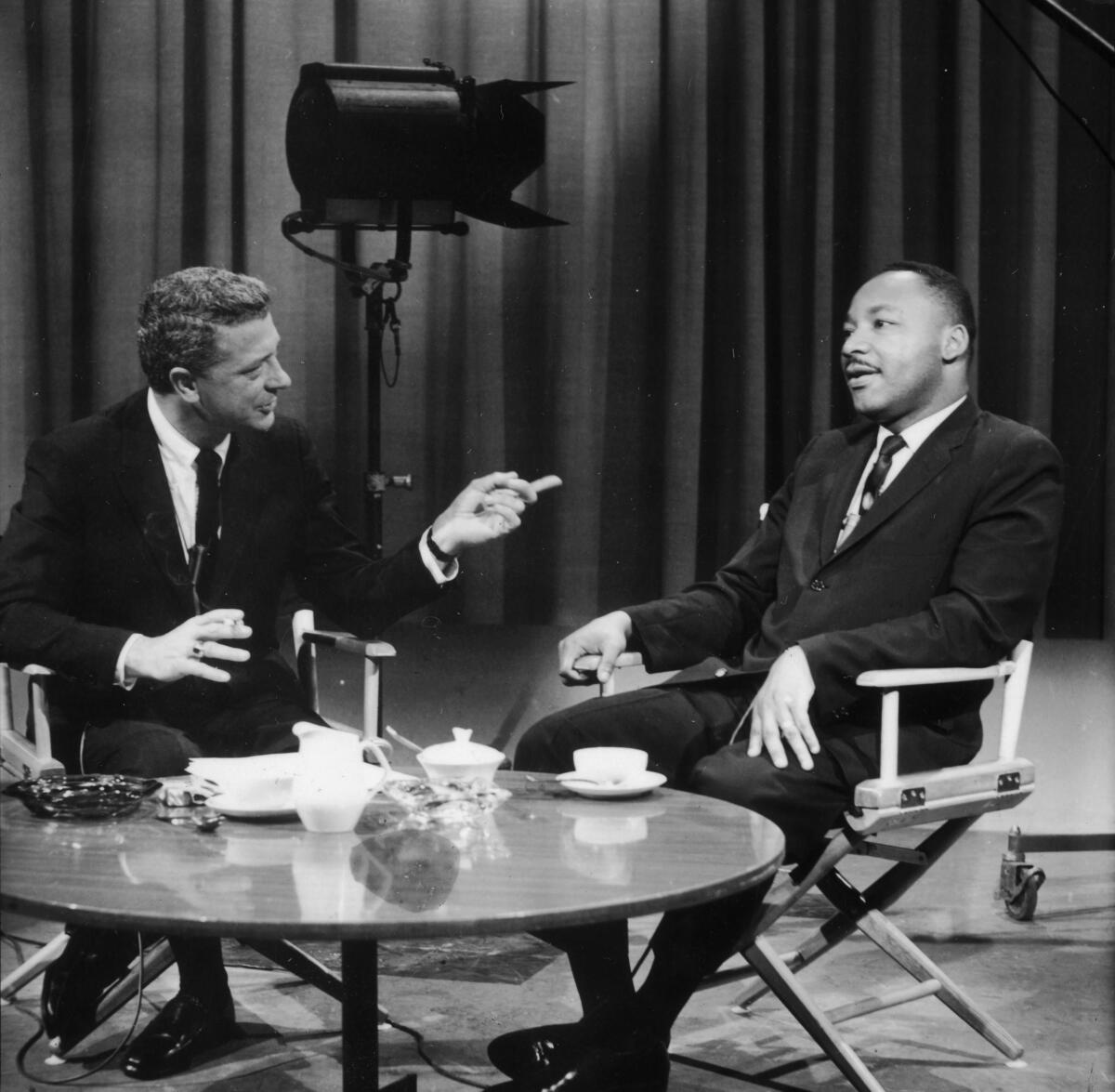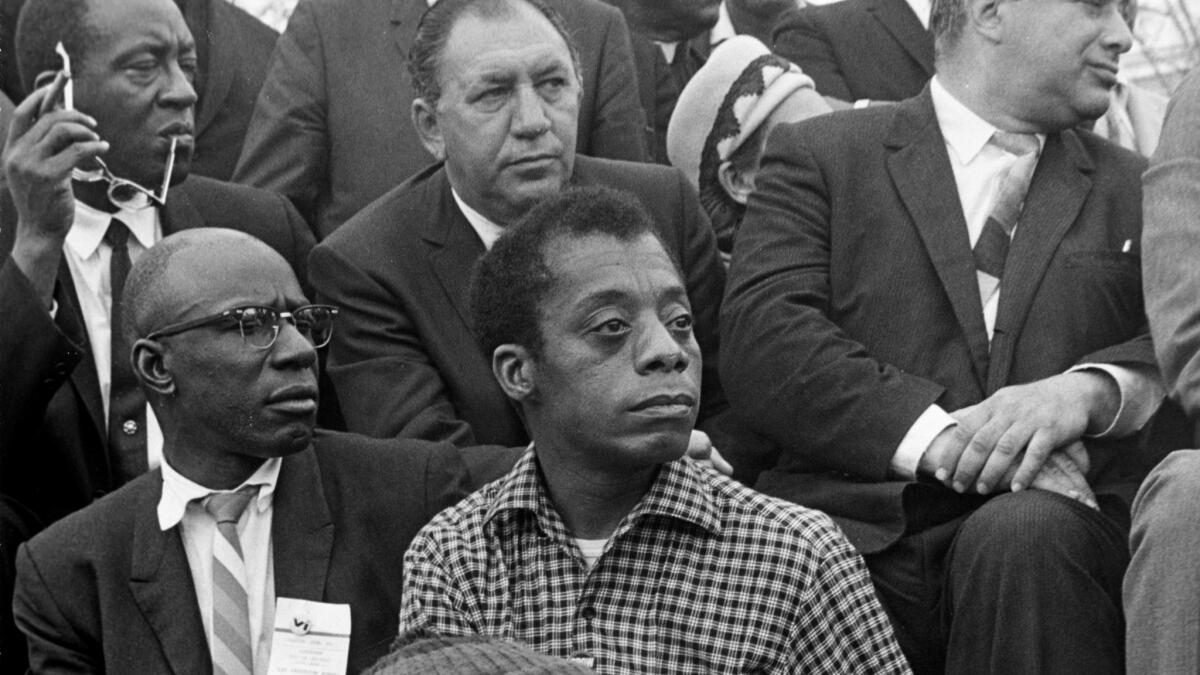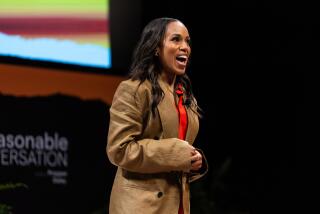He risked his career to interview Martin Luther King. It’s now streaming for the first time

- Share via
Watching talk-show host David Susskind’s historic June 1963 sit-down with the Rev. Martin Luther King Jr., it’s easy to become nostalgic for a time when there was more substantive discourse on television.
The one hour, 41-minute conversation, which took place two months after King was jailed for leading civil rights protests in Birmingham, Ala., makes its streaming debut Tuesday on Amazon Prime and on DVD through MVD Entertainment Group. The black-and-white video, restored by the Paley Center for Media, hasn’t been seen since it first aired on Susskind’s syndicated program, “Open End.”
King revealed to Susskind his plans for a march on Washington later that year. He sharply criticized President John F. Kennedy for not living up to his campaign promises on civil rights, saying the administration “substituted an inadequate approach for a miserable one.” He even quipped about fears that his movement promoted interracial marriage, saying “the Negro wants to be the white man’s brother, not his brother-in-law.”
There was a haunting moment during the interview as well, when Susskind asked King if he considered it “a miracle” that he had not been murdered. King admitted that he had pondered the same question and said it was “the grace of God” that there had been no serious attempt on his life at that point. King died from an assassin’s bullet five years later.
King was at his best that night, delivering his message in the powerful but measured tones that represented his non-violent movement. But the calmness on set belied the turmoil Susskind went through to get the program on the air, and therein lies a tale.
Susskind was a dominant figure in the early decades of television, first as an agent-turned-producer of live TV drama in the 1950s. His New York-based company Talent Associates delivered daring shows in the 1960s, such as the social issue-oriented “East Side, West Side,” which hired politically blacklisted writers. He also made prestige projects such as “Eleanor and Franklin,” a TV movie about the Roosevelts that earned a then-record-setting 11 Emmys in 1976.
But Susskind, who was a cousin of legendary TV producer Norman Lear, became widely known to the viewing audience for his weekly late-night salon “Open End,” which launched in 1958 and ran on mostly big-city TV stations across the country for 30 years. The title referred to the program’s free-flowing running time in its early years. Susskind and his guests would chat on a smoke-filled set as long as they wanted. The Newark, N.J. TV station where the show originated signed off for the night when they were done.
“Open End” generated worldwide headlines in 1960 when an almost absurdly confident Susskind invited Nikita Khrushchev on his program during the Soviet premier’s U.S. visit, ignoring the State Department‘s request that media outlets not give the Communist leader a TV platform.
By 1963, Susskind’s show had developed a reputation for highbrow chatter with authors, journalists and politicians. But the Harvard-educated host became intrigued by the cultural shifts occurring in that transformational decade. Changing sexual mores became a common theme on the program, as did the burgeoning movement against racial discrimination and segregation.
Neither topic appealed to Bennet Korn, a rigid TV executive from Washington who became the general manager of WNEW-TV in New York, Susskind’s flagship station at the time. Korn often shared his dismay over Susskind’s provocative panels with the FBI agents with whom he occasionally met when he was running the station.
According to Susskind’s FBI file, which I uncovered when researching the 2010 biography “David Susskind: A Televised Life,” the bureau closely monitored his program for 15 years. Agents occasionally turned up at WNEW-TV studios on Manhattan’s Upper East Side to review tapes of the episodes.
Dozens of bureau reports made notes on Susskind guests who supported King, opposed the Vietnam war or were critical of the FBI and its director, J. Edgar Hoover. There was even a lengthy memo on a Susskind episode called “Is the FBI Spying On You?”
But the information exchange with the station and the bureau heated up in spring 1963 as Korn grew irritated with Susskind’s desire to book figures involved in the civil-rights movement. Korn had already compiled a long list of topics he wanted Susskind to keep away from, including homosexuality, abortion, Soviet dancer Rudolf Nureyev and the FBI.
Susskind lined up entertainer Harry Belafonte, a close ally of King, and writer James Baldwin, whose manifesto on race relations, “The Fire Next Time,” had just appeared in the New Yorker, for a discussion titled “The American Negro Speaks His Mind.” Korn balked at the idea, demanding more voices on the program to provide a “broader” range of opinions.

Already angry that Korn refused to air a panel discussion on the sexual revolution that included Playboy founder Hugh Hefner, Susskind refused. “David never backed away from these things,” Susskind’s producer Jean Kennedy told me in 2009. “In fact, he relished it.”
With his contract with WNEW-TV soon reaching an end, Susskind called reporters to say he was leaving the station due to Korn’s interference. His parting words described Korn as being better suited to run a delicatessen. “He should sell liverwurst, not entertainment,” said Susskind, always ready with a pithy quote. Korn countered with a press conference that showed a clip of the banned sexual revolution show. He contended that he had decided months earlier not to renew Susskind.
The media maelstrom that ensued scared off Belafonte and Baldwin from appearing on “Open End.” Susskind found himself with no guests, and no New York outlet to air his program. Meanwhile, Korn celebrated Susskind’s departure at a lunch with FBI agent Deke Deloach, a close adviser to Hoover. The director scribbled “Goodbye to bad rubbish” on a wire story account of the controversy.
But tensions continued to rise in the South that spring, and network news brought the horrific images of protesters being beaten by police into living rooms throughout the the country. Jean Kennedy called King and offered him a full two hours with Susskind.
King had been on the program before, and while he found Susskind’s style to be on the sensational side, he accepted the invite. Kennedy believed that King was drawn to the length of the program and that Susskind was sympathetic to his cause. “David was not supposed to be taking sides, but he often did,” she said.
With an exclusive interview of a major figure at the center the biggest story in the country in hand, Susskind offered the program to another New York station, WPIX. Fred Thrower, the executive who ran the outlet, was known for complaining about the number of black acts appearing on the teen dance show WPIX carried. But he put his prejudices aside for the chance to upstage competitor WNEW, giving Susskind $500 and a share of the ad revenue for the program.
Reaction to the program revealed the divisions in the movement. Jean Kennedy said after the program aired that she received a phone call from Malcolm X, still aligned with the Black Muslims and increasingly critical of King’s adherence to nonviolence. “He called to tell me how many girlfriends Dr. King had,” she recalled.
King’s powerful appearance — taped on June 6, 1963 and shown on June 9 — helped set in motion President Kennedy’s decision to give a prime-time TV address from the Oval Office two days later. The president declared that the nation faced “a moral crisis” and needed to end racial segregation and discrimination. He proposed the legislation that later became the Civil Rights Act of 1964.
‘David Susskind Archive: Interview With Dr. Martin Luther King Jr.’
Where: Amazon Prime
When: Any time
Rating: 13+ (Not suitable for children younger than 13)
More to Read
The complete guide to home viewing
Get Screen Gab for everything about the TV shows and streaming movies everyone’s talking about.
You may occasionally receive promotional content from the Los Angeles Times.







